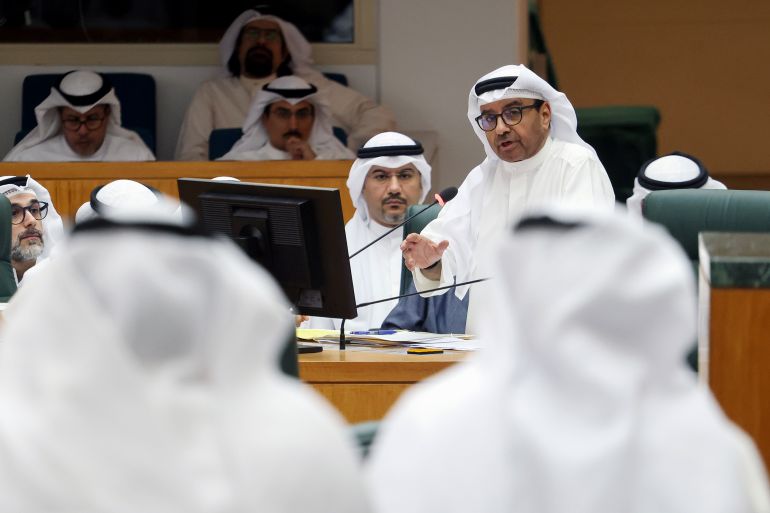What is the Kuwaiti-Iranian dispute over the Dorra/Arash gas field?
The offshore field, known as Arash in Iran and Dorra in Kuwait and Saudi Arabia, has long been a source of contention between the three countries.

An offshore gas field in the Gulf waters has long been a bone of contention among the two countries claiming ownership over it.
Located on the eastern maritime border of Kuwait, the Dorra gas field was discovered in 1967. Iran, which calls the field Arash, says the field extends into its waters.
Keep reading
list of 3 itemsSaudi, Kuwait to develop gas field despite Iran condemnation
Iran’s IRGC runs military drills on disputed islands claimed by UAE
Kuwait and Saudi Arabia, who share maritime gas and oil resources in the zone between them, signed an agreement last March to jointly develop the field. Days later, Iran objected to the deal, branding it “illegal”, and said it would launch its own plans to develop the field.
Last week, Kuwait and Saudi Arabia rejected Iran’s ownership claims after Tehran threatened to pursue exploration. But on Thursday, Kuwait said that it’s foreign minister had been invited to visit Iran.
Here’s the story so far:
What’s the history here?
The dispute over Dorra/Arash dates back to the 1960s, when Iran and Kuwait were each awarded an offshore concession, one to the former Anglo-Iranian Oil Company – the forerunner to BP – and one to Royal Dutch Shell.
The two concessions overlapped in the northern part of the field, whose recoverable reserves are estimated at some 220 billion cubic metres (7 trillion cubic feet).
Iran moved drilling equipment into the field in 2001, prompting Kuwait to lodge complaints with international organisations. Iran stood down its preparations for exploitation, as did Kuwait, which put a stop to plans it had with Saudi Arabia in the area.
What is Kuwait and Saudi Arabia’s position?
In a joint statement on Thursday, Kuwaiti and Saudi authorities said that “they alone have full sovereign rights to exploit the wealth in that area”.
They renewed “their previous and repeated calls to the Islamic Republic of Iran to negotiate” the demarcation of their maritime borders to settle the issue, according to the statement carried by the official Saudi Press Agency (SPA).
The Saudi foreign ministry said it reaffirms its joint ownership of the natural resources in the Dorra gas field with Kuwait and called on Iran to negotiate the eastern border of the area regarding Saudi Arabia and Kuwait as one negotiating party.
Has there been an attempt to reach a deal?
For years, Iran and Kuwait have held unsuccessful talks over their disputed maritime border area, which is rich in natural gas.
Last month, Kuwait invited Iran for another round of talks after Tehran said it was ready to start drilling in the field.
But recent attempts to revive negotiations have failed. Kuwait’s Oil Minister Saad al-Barrak was recently quoted on July 27 as saying his country would begin “drilling and production” at the Dorra gas field without waiting for a demarcation deal with Iran.
This prompted Iran’s oil minister to counter on Sunday, saying Tehran may pursue work at the field without an agreement.
“Iran will pursue its rights and interests regarding exploitation and exploration” of the field “if there is no desire for understanding and cooperation”, Javad Owji was quoted as saying by the official Shana News Agency.
Owji added that his country had informed Kuwait of its willingness to work and jointly invest in the field.
Why is Saudi Arabia involved?
Saudi Arabia and Kuwait share a border, and a section of it included a shared zone of several thousand square kilometres that the two would share control of, according to the Uqair Convention of 1922.
This partitioned Neutral Zone was found to have a number of resources and it was agreed that maritime resources there would be shared equally between the two.
With Dorra/Arash lying in that zone, Saudi Arabia’s interests are tied up in the resolution of this dispute.